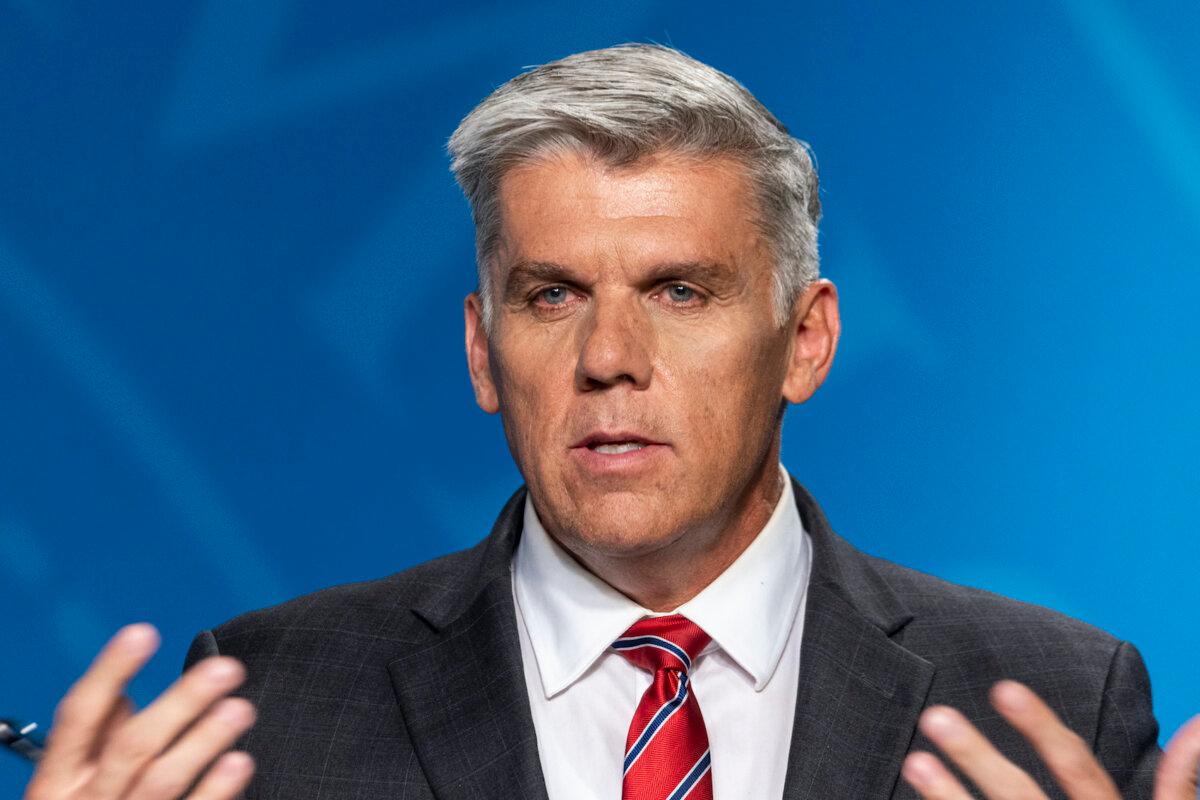Incumbent Gov. Spencer Cox and state Rep. Phil Lyman describe two different approaches to Utah’s government in a debate two weeks before primary election.
Gov. Spencer Cox and state Rep. Phil Lyman (R) hit the debate stage on June 11 ahead of Utah’s Republican gubernatorial primary.
The debate pitted an incumbent governor against a state legislator, giving both candidates a chance to highlight the strengths of their respective campaigns and policy positions two weeks before the June 25 primary.
Questions probed their opinions on issues including illegal immigration, abortion, affordable housing, eliminating Utah’s state income tax, and the prospect of bringing the Olympics back to Salt Lake City in 2034.
Mr. Cox said abortion should be left to the states while also joining Mr. Lyman in supporting the Dobbs decision that overthrew Row v. Wade.
When asked how the future governor would balance the need for immigrant labor against the need for a secure border, Mr. Cox said, “When it comes to the border, every state is a border state right now,” noting that millions of illegal immigrants have been bussed to states around the country.
The governor also emphasized the need to fix legal immigration.
“We need good people.”
Mr. Lyman called for a “more aggressive stance” on illegal immigration in his response.
“We’ve got to be able to deport these people, and our policies should be able to distinguish between a mother who’s a refugee and [fentanyl dealers],” he said.
As for what the candidates would do to make housing more affordable for Utahns, their approaches diverged.
Mr. Cox called affordable housing “the single most important issue in our state right now.”
He referenced recent legislation to build 35,000 starter homes in the state that would cost under $300,000.
Mr. Lyman disagreed, suggesting that only the free market, not the government, can address the housing affordability crisis. Throwing money at it is “not going to fix the problem,” he added.
Both candidates were receptive to the idea of eliminating Utah’s state income tax but disagreed on the topic of bringing the Olympics back to Salt Lake City in 2034. Mr. Cox supports the plan and believes it will be an economic boon for the state.
Mr. Lyman expressed concerns that the sporting event could strain the state’s infrastructure and be a “tremendous cost to our city, to our state, and to the people who live in Utah.”
Mr. Cox was first elected governor of Utah in 2020, defeating Democrat Chris Peterson 63 percent to 30.3 percent. He is chairman of the National Governors Association and was recently endorsed by the National Rifle Association’s Political Victory Fund.
Mr. Lyman was first elected to serve Utah’s 69th district in 2022, beating Democrat Davina Smith 59 percent to 41 percent. He received majority support in the Utah GOP’s 2024 State Nominating Convention on May 1.
Post-Debate Briefing
After the debate, both candidates spoke to the press individually on topics such as in vitro fertilization, election integrity, and their reactions to the debate.
A reporter asked the two candidates if they would accept the results of the primary election.
“I assure you, I will accept the results of this election. I will accept the results of a federal election. I accepted the results of the elections four years ago, and nothing has changed,” Mr. Cox said.
He added that Republicans don’t win any votes by “telling people that their votes don’t count.” The governor touted election integrity bills passed during his term and efforts to put more security measures in place “than ever before.”
“I can tell you that our elections in this state are absolutely secure,” he added.
Mr. Lyman instead said he would be “checking the results of the election.” He said elections must be “verifiable” and alleged that Mr. Cox was withholding the source of the signatures he used to qualify for the June 25 primary.
“There’s a huge lack of transparency,” Mr. Lyman added.

Mr. Cox said he supports family access to in vitro fertilization (IVF), which faces an uncertain future after the Alabama Supreme Court recently ruled that embryos are children under state law.
He called the technology an “incredible miracle” that “gives families who wouldn’t otherwise be able to have a child a child” and vowed to veto any bills from the state legislature that would follow in the path of Alabama’s high court.
The briefing concluded before the reporter could ask Mr. Lyman his position on IVF.
When asked their impressions of the debate, both candidates seemed to be relieved that it elicited little drama.
“It was boring,” Mr. Cox said. “And I hope it was boring for everyone who was watching because the best debates should be boring. They should be about policy.”
Mr. Lyman said he was “interested in talking about the truth” and described the night as a “tame debate atmosphere.”
He also complimented Mr. Cox for doing a “good job on answering the questions” despite his policy disagreements with the governor.
“Anything I do is not for a political platform,” Mr. Lyman told The Epoch Times in March.
The winner of the primary will face state Rep. Brian King (D) on Nov. 5. The race typically favors Republican candidates as Utah hasn’t had a Democratic governor since 1985.
John Haughey and The Associated Press contributed to this report.














